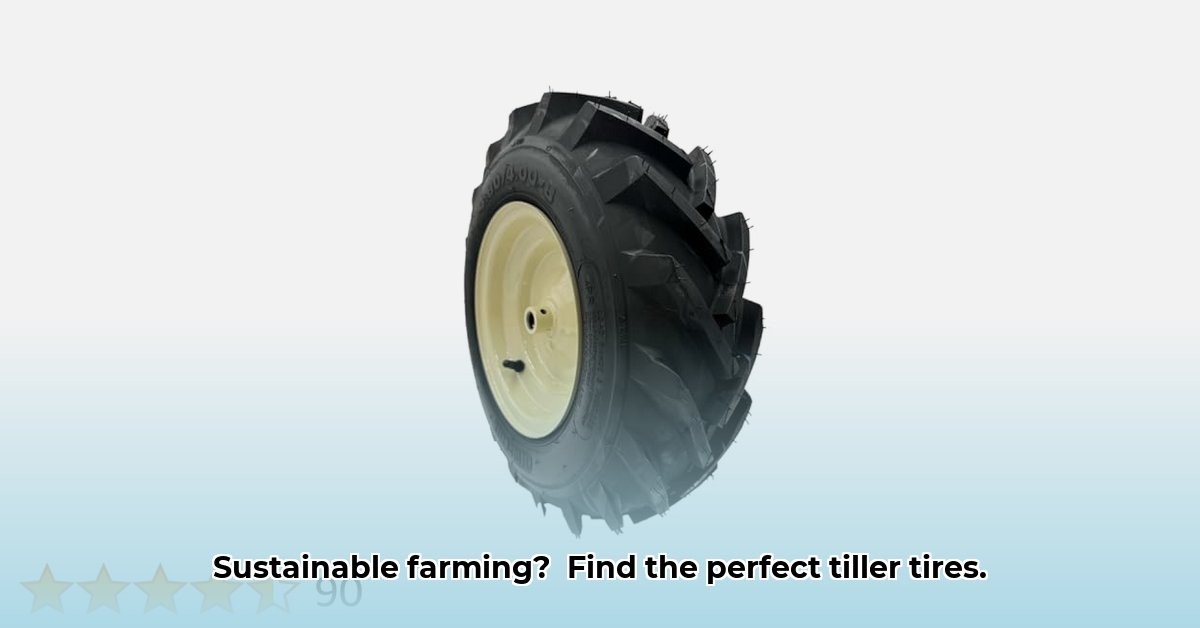
Choosing Green for Your Garden & Wallet
Selecting the right tires for your tiller significantly impacts your farming operation's efficiency and environmental footprint. This guide focuses on choosing sustainable 4.80-8 tiller tires from Tractor Supply, balancing cost-effectiveness with environmental responsibility. It’s about more than just the initial purchase price; it's about long-term savings and a smaller environmental impact. Did you know that improper tire pressure alone can significantly impact fuel consumption? For more on tire sizes, check out this helpful guide: Tractor Tire Sizes.
Understanding the Importance of Tiller Tires
Tiller tires are crucial for efficient and sustainable farming. They directly influence fuel consumption, soil health, and the overall lifespan of your equipment. Using the wrong tires can lead to increased fuel costs, soil compaction (hindering plant growth), and more frequent, expensive replacements. This translates to unnecessary waste in landfills and higher operational expenses.
Decoding Tractor Supply's 4.80-8 Tiller Tire Options
Tractor Supply offers various 4.80-8 tiller tire options. Don't solely prioritize the cheapest option; consider long-term performance and environmental impact. While initial cost is a factor, the lifespan and overall performance of the tires are equally important. Proper inflation is paramount; underinflation reduces traction and wastes fuel, while overinflation can damage the tire.
When comparing tires, consider these key features:
- Rubber Resilience: Choose tires made from durable rubber compounds designed to withstand the stresses of tilling. (This affects the tire's lifespan and reduces the need for frequent replacements).
- Tread Design: An aggressive tread pattern with deep grooves provides superior grip, especially crucial in wet conditions. (This improves traction, reduces slippage, and saves fuel).
- Tire Construction: A robust tire construction ensures longevity and better performance under pressure. (A well-built tire will last significantly longer, reducing waste).
Going Green: Sustainable Choices for Your Tiller Tires
Sustainable agriculture encompasses all aspects of your operation, including tire selection. Choosing eco-friendly tires offers significant long-term benefits.
- Extended Tire Life Minimizes Waste: High-quality tires reduce the frequency of replacements, minimizing tire waste in landfills, a crucial aspect of sustainable farming practices.
- Optimized Fuel Efficiency: Properly inflated tires reduce fuel consumption, lowering costs and reducing your carbon footprint. (Studies show a significant correlation between proper inflation and fuel efficiency in agricultural machinery).
- Improved Soil Health: Minimizing soil compaction through appropriate tire selection fosters healthier soil structure, reducing erosion and enhancing plant growth. (Reduced compaction promotes better water infiltration and root development).
Actionable Steps for Maximizing Tiller Tire Lifespan
Proactive tire maintenance is vital for extending their lifespan and reducing waste.
- Regular Inspections: Inspect tires regularly for wear, cuts, bulges, or unusual wear patterns. (Early detection can prevent costly repairs or premature replacements).
- Maintaining Proper Inflation: Always maintain the recommended tire pressure (found on the tire sidewall). (This is crucial for fuel efficiency, maximum traction, and tire longevity).
- Periodic Tire Rotation: Rotate tires periodically to distribute wear evenly and prolong their life. (This simple step can significantly extend the tire's useful life).
- Appropriate Storage: Store tires in a cool, dry location away from direct sunlight and extreme temperatures when not in use. (This prevents cracking and deterioration, ensuring they are ready for the next season).
Expanding Your Sustainable Farming Practices
Choosing durable tires is just one step towards sustainable farming. Fuel efficiency is equally crucial. Explore precision farming techniques to optimize fuel usage and minimize environmental impact. Remember the importance of regular maintenance and efficient route planning for maximum impact. Research continues into eco-friendly tire technologies, promising further improvements in soil health and fuel efficiency. Stay updated on these advancements to make the most informed choices for your farm's future.
Three Pivotal Points:
- Tire choice substantially affects fuel efficiency, soil health, and farm profitability.
- Prioritizing durable, well-constructed tires minimizes waste and reduces long-term costs.
- Sustainable practices extend beyond tire selection; consider fuel efficiency and soil health holistically.